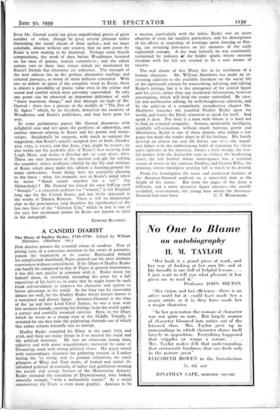A CANDID DIARIST
The Diary of Dudley Ryder, 1715-1716. Edited by William Matthews. (Methuen. 16s.)
FEW diarists possess the essential virtue of candour. Fear of prying eyes, or a conscious attention to the views of posterity, poison the inspiration at its source. Barricaded behind his complicated shorthand, Pepys poured out his most intimate experiences without concealment. If the Diary of Dudley Ryder can hardly be compared to that of Pepys in general importance, it has this rare quality in common with it. Ryder wrote for himself alone, in shorthand, intending his notes for a full exposition of his feelirgs, in order that he might learn by such frank self-revelation to improve his character and appear to better advantage in the world. In the long run he succeeded almost too well, for the Dudley Ryder whom history knows is a restrained and distant figure. Attorney-General at the time of the '45 and later Lord Chief Justice, he was a man with few intimate friends, covering his feelings from the world under a correct and carefully assumed exterior. Here, in the Diary which he wrote as a young man at the Middle Temple, is revealed for the first time the palpitating chrysalis out of which this rather solemn butterfly was to emerge.
Dudley Ryder compiled his Diary in the years 1715 and 1716, and there are many things in it to interest the social and the political historian. He was an observant young man, talkative and with many acquaintances; moreover he came of Dissenting stock with strong political views. His pages reveal with extraordinary clearness the gathering tension in London during the '15 rising, and its gradual relaxation; we catch glimpses of Whig and Tory mobs, of heated and rather ill- informed political discussions, of ladies and gentlemen wearing the purple and orange favours of the Hanoverian dynasty. Ryder attended the execution of Derwentwater, who looked, naturally enough, " with a melancholy aspect." As a social commentary the Crary is even more graphic. Anxious to be
a success, particularly with the ladies, Ryder was an acute observer of even the smallest particulars, and his descriptions of his efforts at courtship, of evenings spent dancing or flirt- ing, are revealing foot-notes on the manners of the early eighteenth century. A shy man himself, he was continually tormented by jealousy of the bolder sparks whose extreme freedom with the fair sex seemed to be a sure means of success.
The real charm of this Diary lies in its revelation of a human character. Mr. William Matthews has made an in- teresting addition to the available literature on the social life of the eighteenth century by transcribing, selecting, and editing Ryder's jottings, but it is the emergence of the central figure and his circle, rather than any incidental information, however entertaining, which will hold the reader enthralled. By care- ful and unobtrusive editing, by well-thought-out selection, and by the addition of a sympathetic introductory chapter Mr. Matthews launches the youthful Dudley Ryder upon the world, and leaves the Diary otherwise to speak for itself. And speak it does. For here is a man with whom it is hard not to find an essential sympathy. Serious, moderately intelligent, painfully self-conscious, without much humour, gentle and affectionate, Ryder is one of those diarists who within a few pages has made the reader share in all his feelings. His family develop an almost too real life before our eves—the impul- sive father with the embarrassing habit of repeating his clever son's opinions in his presence, always a little wrong; the fret- ful mother with the deplorable taste in clothes; the headstrong sister; the fast brother whose extravagance was a constant source of worry to the cautious Dudley; and Cousin Billio, the minister, whose extempore praying left so much to be desired.
From the frontispiece the suave and composed features of the Attorney-General confront us, a successful man at the height of his career. But from the pages of the diary a different, and a more attractive figure emerges—the unself- confident, over-anxious, shy young man whom the Attorney-










































 Previous page
Previous page